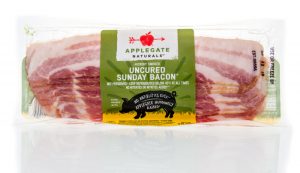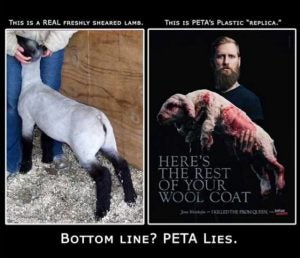PETA is at it again. On June 27, People for the Ethical Treatment of Animals submitted a petition to the U.S. Department of Agriculture’s Food Safety and Inspection Service “urging” the agency to remove any labels that make claims as to the way animals are raised. The heart of the petition is that PETA believes no way of raising livestock is humane or appropriate, so to say anything to the contrary on food labels is wrong in the organization’s eyes. However, the petition gets more into the legalese by arguing that the FSIS doesn’t have the scope to inspect producers or confirm documentation, and thus what’s on food labels has the potential to be incorrect.
The petition claims, “By approving labels without confirming, or even the ability to confirm, the information supporting the claims on them, FSIS is allowing companies to make variable, unverifiable, and false claims, thereby also violating its statutory responsibility to ensure labels on meat products are not false or misleading. By gaining agency approval, companies can then charge a surplus for ‘humanely’ raised products, as the public is often willing to pay more for products they are led to believe were made without harming animals.”

A longtime thorn in the side of animal agriculture, PETA claims to be the largest animal rights organization in the world. But what exactly does PETA do for animals? Aside from being staunchly anti-agriculture, PETA also abhors domestication and ownership of cats and dogs. Repeat, they do not help cats and dogs. They just don’t want you to own one.
»Related: Viewpoint: Targeting ag youth brings out the worst in animal-rights activism
On their website, PETA touts that, “The only ‘humane’ meal is a vegan one. PETA is calling on the feds to amend rules and stop certifying bogus claims about animals raised for food.” They continue in their article with, “Exploiting animals for food — like eggs and cow’s milk — leads to harm, suffering, and death. If you really care about animals, the environment, and your health, there’s only one animal-friendly label you should look for: ‘Vegan.'”
Nevermind that everyone has known for decades that growing cornerstone foods for vegan and vegetarian diets leads to the death of millions of animals each year.
The tactic from PETA should come as no surprise, though. The intended shock value in their marketing approach is sometimes laughable. And it’s amazing what simple things draw hatred from animal-rights activists. Such as in the case of a “Bloody Shorn Lamb”, the organization isn’t afraid to stretch the truth. But again, what does PETA actually do for animals? Seriously. We’ve tried to figure that out, too. That is, aside from touting veganism as the only humane option — but again, the truth and reality are way more complex.

PETA says that the FSIS has no jurisdiction to regulate the producers raising animals. That the Federal Meat Inspection Act and the Poultry Meat Inspection act do not grant authority to the FSIS for the regulation of animals raised for meat production.
In 2019, the FSIS released a Labeling Guideline on Documentation Needed to Substantiate Animal Raising Claims for Label Submission. The document provides guidance about the type of documentation producers need to provide in order for FSIS to approve the labeling of meat products.
Continuing, the petition says that because of its lack of jurisdiction, FSIS has no way to inspect and verify claims regarding the conditions that animals are raised in, and as such, should remove any guidelines or approvals for labeling. Such labels include “humanely raised,” “raised in a stress-free environment,” or “free to roam.”
PETA claims that these labels are misleading and violate the FSIS’s legal responsibility to ensure labels are not misleading or false. We’d like to ask PETA more about the authenticity of their “undercover” videos and photos?
Farmers, and ranchers overwhelmingly care about the welfare of their animals. It just doesn’t pay for them not to. Anyone can submit a petition to the FSIS — interested parties can also submit comments on a petition.


